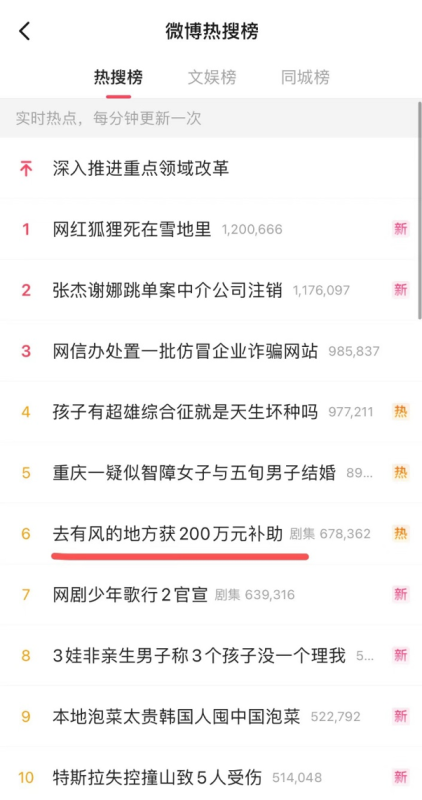China Brands, Marketing & Consumers
Show-Inspired Journeys: Chinese Netizens Explore Next Travel Destination Through Favorite TV Series
The rising influence of Chinese TV dramas on tourism highlights the synergy between entertainment & social media in China, serving as a powerful tool for travel promotion.
Published
1 year agoon

The Chinese TV series Meet Yourself has significantly boosted the popularity of Dali in Yunnan. The series’ success, coupled with the official funding behind it, not only underscores the impactful role of Chinese dramas in tourism but also illustrates how Chinese travel destination promotional strategies are being reshaped in a competitive post-Covid era.
On December 25th, the Dali Bai Autonomous Prefecture’s Culture and Tourism Bureau in Yunnan Province, Southwest China, announced a proposed subsidy of 2 million yuan ($282k) for the Chinese TV series Meet Yourself (去有风的地方).
The news soon went trending on Weibo (#去有风的地方获200万元补助#). Many found it noteworthy, especially since the announcement clarified that this funding is part of the prefecture’s special fund for cultural and tourism industry development, and the TV series was the only project under consideration.

There are several reasons why Dali might consider this strategy.
Firstly, Dali plays a pivotal role in Meet Yourself. Launched in January 2023, the TV series quickly became an online sensation, achieving an impressive rating of 8.7 out of 10 on Douban—a platform in China similar to IMDb. Spanning 40 episodes, the series features actress Liu Yifei (刘亦菲), renowned for her role in Disney’s live-action Mulan, and Chinese actor Li Xian (李现).

Promotional image for Meet Yourself (去有风的地方).
The narrative follows a white-collar worker in her mid-30s who, following her best friend’s unexpected cancer diagnosis and subsequent passing, embarks on a quest to understand the true meaning and purpose of life.
The TV series not only captivated audiences because of its soothing narrative about life and interpersonal relationships, but the show was also a hit because most of its scenes were filmed in Dali and showed picturesque rural landscapes and portrayed a slow-paced, idyllic lifestyle.
The show accumulated more than 3 billion views on the streaming platform Mango TV by the time its final episode aired on February 2, 2023. It also sparked numerous trending topics on Weibo during that time. For instance, one snapshot from the drama, “Liu Yifei Holding Flowers” (刘亦菲捧花), also went viral, with many netizens even changing their profile pictures to this image. Captivated by Liu’s beauty and charm, they believed that the image possessed some sort of magical power, like the symbolic significance of koi fish in Chinese culture and how they’re believed to bring good luck.

The ‘lucky’ Liu Yifei holding flowers image.

The lucky Liu Yifei holding flowers meme spread across social media in various ways.
Benefiting directly from the popularity generated by the TV series, Yunnan experienced a surge in visitors during the 2023 Spring Festival holiday. This influx significantly boosted its tourism revenue to an impressive 38.4 billion yuan (approximately US$5.4 billion), surpassing all other provinces and regions in the country.
The primary filming location of the drama, the Dali Bai Autonomous Prefecture, welcomed over 4.2 million visitors, marking a significant year-on-year increase. Within the first six days of the holiday, Dali boasted the highest room occupancy rate nationwide, and became the fifth most visited tourist destination across the country.
TV Series Inspiring Real-Life Travel to Featured Destination
Dali is not the only city or travel destination that has become popular because of Chinese dramas or TV shows. The recent Chinese TV series There Will Be Ample Time (故乡,别来无恙), in which Chengdu plays a major role, has also come to be seen as a promotion for the Sichuan Province capital city.
The series revolves around four women who grew up together, chose different paths in life, and then reconnect in Chengdu. The series showcases the city’s laid-back lifestyle, especially in contrast to the fast-paced metropolises like Beijing and Shanghai where the featured women return from.

Scene from There Will be Ample Time (故乡,别来无恙).
Back in 2003, the TV series Lost Time (似水年华), which was filmed in the historic scenic town of Wuzhen, also became popular. Lost Time was written, directed, and starred by the renowned Chinese actor and director Huang Lei (黄磊). The series narrates a poignant love story of a couple in their thirties who meet in Wuzhen, only to be separated by the vast distance between Wuzhen and Taipei.
The TV series successfully showcased the timeless beauty of the Wuzhen water town to a broader Chinese audience and, indirectly, promoted the town’s unique artistic and cultural atmosphere. This later led to the establishment of the Wuzhen Theatre Festival, a celebration of performing arts and a center for cultural exchange. The festival has since become one of the premier events in China and Asia. Each year, as the festival unfolds, there is a significant increase in business, with tourists flocking to the area.
On social media today, Lost Time is still seen as one of the major reasons why Wuzhen became so popular among Chinese travelers.

Wuzhen featured in Lost Time (似水年华).
But it’s not only the television series that portray a slower-paced and romantic lifestyle that motivate viewers to visit the showcased destinations. In 2020, the filming locations of the popular Chinese crime and suspense drama The Bad Kids (隐秘的角落) not only entertained its audience but also boosted tourism in the actual places where it was shot.
Much of the filming for the TV thriller took place in Chikan, an old township located in Zhanjiang in Guangdong. As a result, Zhanjiang’s popularity as a tourist destination skyrocketed by 261 percent in a single week.
Earlier in 2023, Jiangmen in Guangdong Province also gained popularity after it was featured in the popular crime TV drama The Knockout (狂飙). As a result, it became a sought-after destination during the May Day holiday, drawing numerous TV enthusiasts to the city. Jiangmen reportedly received over 765,200 visitors in the first two days of the May Day holiday alone, generating a revenue of approximately 439 million yuan (US$62.2 million).
Jiangmen’s popularity went beyond the May Day holiday. The Knockout caused a steady influx of visitors to the Guangdong city. From January to October of 2023, the city saw a total of 20,278,200 tourists, a reported year-on-year increase of 85.36%. This resulted in a tourism revenue of 19.649 billion yuan, representing an impressive increase of 133.77%.
Beyond the TV Screen: Social Media Creating Travel Hits
Over the past few years, we’ve seen how there are always unpredictable factors that help Chinese destinations suddenly become a hit among travelers. For instance, in late 2021, a song titled “Mohe Ballroom” (漠河舞厅) gained popularity across various social media platforms in China. This song narrates the story of a man who, for thirty years, danced alone in the Mohe Ballroom following the death of his beloved wife.
Prior to the song’s release, many Chinese netizens were familiar with Mohe as it is the northernmost point of China, and it is extremely cold. As the song gained traction on social media, the local government seized the opportunity to promote the city’s ice and snow tourism. Now, Mohe has emerged as a new destination for tourists seeking a unique, chilly experience.
Another example is Zibo, an ancient industrial city, which treated students well during their Covid quarantine period. So, when China lifted all Covid restrictions in the spring of 2023, these students returned to express their gratitude and celebrate the city. Their contagious enthusiasm, coupled with their social media posts about the city, sparked nationwide interest and people soon flocked to Zibo to enjoy the vibe and the local BBQ (read more here).
During the summer of 2023, the city of Tianjin became online hit due to a group of energetic seniors who transformed a local bridge into a stage for their remarkable water acrobatics. Tianjin’s so-called “diving grandpas” attracted attention for their daring dives into the river from the Stone Lion Forest Bridge (狮子林桥). Videos of their dives quickly went viral on China’s social media, drawing tourists, including many foreign residents in China, to witness the spectacle firsthand. Some people even joined to dive, including He Chong (何冲), the 2008 Olympic Champion in the 3m springboard.

Tianjin’s diving grandpas had to stop their diving activities after rising to internet fame, causing too many people to dive into the river.
In a playful twist, some visitors created their own scorecards, acting as judges and rating the divers’ performances. However, this spontaneous event eventually had to be toned down due to safety concerns. Despite this, the event kept Tianjin in the spotlight for quite a while as a tourist destination.
Social media has become a vital tool for cities and tourist destinations aiming to attract potential visitors. While some destinations organically become online sensations due to a combination of factors, other efforts are more deliberate and strategic. For instance, in spring of 2023, Chinese local government officials went all out to promote their hometowns via online channels, going viral on Weibo, Douyin, and beyond for dressing up in traditional outfits and creating original videos about their hometowns with low to zero budget.
However, when an article by Xinhua News criticized this approach, suggesting that local officials should prioritize improving service quality in their hometowns rather than striving for internet fame, the online trend appeared to wane.
Over the last year, different regions and industries in China made significant efforts to boost their local economies through tourism to recover from the impact of the pandemic. The China Tourism Academy recently published a report that forecasts that the number of China’s domestic tourists in 2023 has hit 5.407 billion, and domestic tourism revenue will amount to 5.2 trillion yuan. This figure allegedly represents a recovery to 90% compared to pre-Covid year 2019.
The upcoming Chinese New Year’s holiday is expected to kick off a promising start for the Chinese tourism industry in 2024. According to Trip.com data, bookings for the 2024 New Year’s holiday have surged by over threefold compared to the corresponding period last year. Furthermore, Tongcheng Travel highlights skiing, hot springs, Northern Lights viewing, music events, outdoor activities, island retreats, cruises, staycations, and firework displays as the top domestic travel preferences during this holiday season.
As China has significantly relaxed several travel and visa policies for both Chinese and international travelers, the number of outbound travel bookings for the New Year’s holiday on Trip.com has also seen a nearly fivefold increase compared to the same period last year while inbound tourism is on the rise.
Meanwhile, the way in which the TV drama Meet Yourself (去有风的地方) has boosted the tourism industry of Dali, which already was a popular tourist destination, is generating ongoing discussions on Chinese social media as it is a good example of how the integration of destination themes can captivate viewers’ attention, inspiring them to visit and discover the real-life locations.
In this way, TV shows serve as powerful platforms for local tourism authorities across China. First, utilizing television series provides them with a higher level of control compared to other methods of online promotion, including more fleeting trends. The show’s narratives, vibe, and filming locations can precisely showcase a destination’s unique features, attractions, and local culture.
Second, featuring destinations in TV series effectively accomplishes two goals at once, as Chinese TV dramas and online communities have become strongly intertwined. This amplifies the influence and reach of such productions, as fans engage, share, discuss, and promote the series and associated destinations across various social media platforms. And so, a featured scene or image, such as the one with Liu Yifei, can transcend the series itself and become an entire trend of its own on Chinese social media channels.
For travelers, visiting a destination featured in a beloved TV drama is not just about exploring a new location—it’s about experiencing a feeling and and immersing oneself in a fantasy. This trend won’t end with Meet Yourself, as new dramas inspire viewers to visit new locations again. As fans are binge watching the TV series Love Me, Love My Voice (很想很想你), Guangxi’s Guilin is the next hotspot attracting attention online for its portrayal in the show. “I finished watching the show,” one viewer wrote, “Now I want to start traveling.”
By Wendy Huang
Follow @whatsonweibo
Edited for clarity by Manya Koetse
Spotted a mistake or want to add something? Please let us know in comments below or email us. Please note that your comment below will need to be manually approved if you’re a first-time poster here.
©2024 Whatsonweibo. All rights reserved. Do not reproduce our content without permission – you can contact us at info@whatsonweibo.com
Wendy Huang is a China-based Beijing Language and Culture University graduate who currently works for a Public Relations & Media software company. She believes that, despite the many obstacles, Chinese social media sites such as Weibo can help Chinese internet users to become more informed and open-minded regarding various social issues in present-day China.

You may like
China Arts & Entertainment
Controversial Wanghong Livestreamers Are Becoming a Weibo Staple in China
‘Wanghong’ was a mark of online fame; now, it’s increasingly tied to controversy and scandal.
Published
5 months agoon
October 27, 2024
As livestreaming continues to gain popularity in China, so do the controversies surrounding the industry. Negative headlines involving high-profile livestreamers, as well as aspiring influencers hoping to make it big, frequently dominate Weibo’s trending topics.
These headlines usually revolve around China’s so-called wǎnghóng (网红) influencers. Wanghong is a shortened form of the phrase “internet celebrity” (wǎngluò hóngrén 网络红人). The term doesn’t just refer to internet personalities but also captures the viral nature of their influence—describing content or trends that gain rapid online attention and spread widely across social media.
Recently, an incident sparked debate over China’s wanghong livestreamers, focusing on Xiaohuxing (@小虎行), a streamer with around 60,000 followers on Douyin, who primarily posts evaluations of civil aviation services in China.

Xiaohuxing (@小虎行)
On October 15, 2024, at Shenzhen Bao’an International Airport, Xiaohuxing confronted a volunteer at the automated check-in counter, insisting she remove her mask while livestreaming the entire encounter. He was heard demanding, “What gives you the right to wear a mask? What gives you the right not to take it off?” and even attempted to forcibly remove her mask, challenging her to call the police.

During the livestream, the livestreamer confronted the woman on the right for wearing a facemask.
He also argued with a male traveler who tried to intervene. In the end, the airport’s security officers detained him. Shortly after the incident, a video of the livestream went viral on Weibo under various hashtags (e.g. #网红小虎行机场强迫志愿者摘口罩#) and attracted millions of views. The following day, Xiaohuxing’s Douyin account was banned, and all his videos were removed. The Shenzhen Public Security Bureau later announced that the account’s owner, identified as Wang, had been placed in administrative detention.
On October 13, just days before, another livestreaming controversy erupted at Guangzhou Baiyun International Airport. Malatang (@麻辣烫), a popular Douyin streamer with over a million followers, secretly filmed a young couple kissing and mocked them, continuing to film while passing through security—an area where filming is prohibited.
Her livestream quickly went viral, sparking discussions about unauthorized filming and misconduct among Chinese wanghong. In response, Malatang’s agent posted an apology video. However, the affected couple hired a lawyer and reported the incident to the police (#被百万粉丝网红偷拍当事人发声#). On October 17, Malatang’s Douyin account was banned, and her videos were removed.

Livestreamer Malatang making fun of the couple in the back at the airport.
In both cases, netizens uncovered additional examples of inappropriate behavior by Xiaohuxing and Malatang in past broadcasts. For example, Xiaohuxing was reportedly aggressive towards a flight attendant, demanding she kneel to serve him, while Malatang was criticized for scolding a delivery person who declined to interact with her on camera.
Comments on Weibo included, “They’ll do anything for traffic. Wanghong are getting a bad reputation because of people like this.” Another added, “It seems as if ‘wanghong’ has become a negative term now.”
Rising Scrutiny in China’s Wanghong Economy
Xiaohuxing and Malatang are far from isolated cases. Recently, many other wanghong livestreamers have also been caught up in negative news.
One such figure is Dong Yuhui (董宇辉), a former English teacher at New Oriental (新东方) who transitioned to livestreaming for East Buy (东方甄选), where he mixed education with e-commerce (read here). Dong gained significant popularity and boosted East Buy’s brand before leaving to start his own company. Recently, however, Dong faced backlash for inaccurate statements about Marie Curie during an October 9 livestream. He incorrectly claimed that Curie discovered uranium, invented the X-ray machine, and won the Nobel Prize in Literature, among other things.
Considering his public image as a knowledgeable “teacher” livestreamer, this incident sparked skepticism among viewers about his actual expertise. A related hashtag (#董宇辉称居里夫人获得诺贝尔文学奖#) garnered over 81 million views on Weibo. In addition to this criticism, Dong is also being questioned about potential false advertising, which is a major challenge for all livestreamers selling products during their streams.

Dong Yuhui (董宇辉) during one of his livestreams.
Another popular livestreamer, Dongbei Yujie (@东北雨姐), is currently also facing criticism over product quality and false advertising claims. Originally from Northeast China, Dongbei Yujie shares content focused on rural life in the region. Recently, her Douyin account, which boasts an impressive 22 million followers, was muted due to concerns over the quality of products she promoted, such as sweet potato noodles (which reportedly contained no sweet potato). Despite issuing public apologies—which have garnered over 160 million views under the hashtag “Dongbei Yujie Apologizes” (#东北雨姐道歉#)—the controversy has impacted her account and led to a penalty of 1.65 million yuan (approximately 231,900 USD).

From Dongbei Yujie’s apology video
Former top Douyin livestreamer Fengkuang Xiaoyangge (@疯狂小杨哥) is also facing a career downturn. Leading up to the 2024 Mid-Autumn Festival, he promoted Hong Kong Meicheng mooncakes in his livestreams, branding them as a high-end Hong Kong product. However, it was soon revealed that these mooncakes had no retail presence in Hong Kong and were primarily produced in Guangzhou and Foshan, sparking accusations of deceptive marketing. Due to this incident and previous cases of misleading advertising, his company came under investigation and was penalized. In just a few weeks, Fengkuang Xiaoyangge lost over 8.5 million followers (#小杨哥掉粉超850万#).

Fengkuang Xiaoyangge (@疯狂小杨哥) and the mooncake controversy.
It’s not only ecommerce livestreamers who are getting caught up in scandal. Recently, the influencer “Xiaoxiao Nuli Shenghuo” (@小小努力生活) and her mother were arrested for fabricating a tragic story – including abandonment, adoption, and hardships – to gain sympathy from over one million followers and earn money through donations and sales. They, and two others who helped them manage their account, were sentenced to ten days in prison for ‘false advertising.’
Wanghong Fame: Opportunity and Risk
China’s so-called ‘wanghong economy’ has surged in recent years, with countless content creators emerging across platforms like Douyin, Kuaishou, and Taobao Live. These platforms have transformed interactions between content creators and viewers and changed how products are marketed and sold.
For many aspiring influencers, becoming a livestreamer is the first step to building a presence in the streaming world. It serves as a gateway to attracting traffic and potentially monetizing their online influence.
However, before achieving widespread fame, some livestreamers resort to using outrageous or even offensive content to capture attention, even if it leads to criticism. For example, before his account was banned, Xiaohuxing set his comment section to allow only followers to comment, gaining 3,000 new followers after his controversial livestream at Shenzhen Airport went viral. Many speculated that some followers joined just to leave critical comments, but it nonetheless grew his following.
As livestreamers gain significant fame, they must exercise greater caution, as they often hold substantial influence over their audiences, making accuracy essential. Mistakes, whether intentional or not, can quickly erode trust, as seen in the example of the super popular Dong Yuhui, who faced backlash after his inaccurate comment about Marie Curie sparked public criticism.
China’s top makeup livestreamer, Li Jiaqi (李佳琦), experienced a similar reputational crisis in September last year. Responding dismissively to a viewer who commented on the high price of an eyebrow pencil, Li replied, “Have you received a raise after all these years? Have you worked hard enough?” Commentators pointed out that the pencil’s cost per gram was double that of gold at the time. Accused of “forgetting his roots” as a former humble salesman, Li lost one million Weibo followers in a day (read more here).

This meme shows that many viewers did not feel moved by Li’s apologetic tears after the eyepencil incident.
Despite the challenges and risks, becoming a wanghong remains an attractive career path for many. A mid-2023 Weibo survey on “Contemporary Employment Trends” showed that 61.6% of nearly 10,000 recent graduates were open to emerging professions like livestreaming, while 38.4% preferred more traditional career paths.
Taming the Wanghong Economy
In response to the increasing number of controversies and scandals brought by some wanghong livestreamers, Chinese authorities are implementing stricter regulations to monitor the livestreaming industry.
In 2021, China’s Propaganda Department and other authorities began emphasizing the societal influence of online influencers as role models. That year, the China Association of Performing Arts introduced the “Management Measures for the Warning and Return of Online Hosts” (网络主播警示与复出管理办法), which makes it challenging, if not impossible, for “canceled” celebrities to stage a comeback as livestreamers (read more).
The Regulation on the Implementation of the Law of the People’s Republic of China on the Protection of Consumer Rights and Interests (中华人民共和国消费者权益保护法实施条例), effective July 1, 2024, imposes stricter rules on livestream sales. It requires livestreams to disclose both the promoter and the product owner and mandates platforms to protect consumer rights. In cases of illegal activity, the platform, livestreaming room, and host are all held accountable. Violations may result in warnings, confiscation of illegal earnings, fines, business suspensions, or even the revocation of business licenses.
These regulations have created a more controlled “wanghong” economy, a marked shift from the earlier, more unregulated era of livestreaming. While some view these measures as restrictive, many commenters support the tighter oversight.
A well-known Kuaishou influencer, who collaborates with a person with dwarfism, recently faced backlash for sharing “vulgar content,” including videos where he kicks his collaborator (see video) or stages sensational scenes just for attention.
Most commenters welcome the recent wave of criticism and actions taken against such influencers, including Xiaohuxing and Dongbei Yujie, for their behavior. “It’s easy to become famous and make money like this,” commenters noted, adding, “It’s good to see the industry getting cleaned up.”
State media outlet People’s Daily echoed this sentiment in an October 21 commentary, stating, “No matter how many fans you have or how high your traffic is, legal lines must not be crossed. Those who cross the red line will ultimately pay the price.”
This article and recent incidents have sparked more online discussions about the kind of influencers needed in the livestreaming era. Many suggest that, beyond adhering to legal boundaries, celebrity livestreamers should demonstrate a higher moral standard and responsibility within this digital landscape. “We need positive energy, we need people who are authentic,” one Weibo user wrote.
Others, however, believe misbehaving “wanghong” livestreamers naturally face consequences: “They rise fast, but their popularity fades just as quickly.”
When asked, “What kind of influencers do we need?” one commenter responded, “We don’t need influencers at all.”
By Wendy Huang
Follow @whatsonweibo
Edited for clarity by Manya Koetse
Spotted a mistake or want to add something? Please let us know in comments below or email us. Please note that your comment below will need to be manually approved if you’re a first-time poster here.
©2024 Whatsonweibo. All rights reserved. Do not reproduce our content without permission – you can contact us at info@whatsonweibo.com
China Books & Literature
Why Chinese Publishers Are Boycotting the 618 Shopping Festival
Bookworms love to get a good deal on books, but when the deals are too good, it can actually harm the publishing industry.
Published
10 months agoon
June 8, 2024By
Ruixin Zhang
JD.com’s 618 shopping festival is driving down book prices to such an extent that it has prompted a boycott by Chinese publishers, who are concerned about the financial sustainability of their industry.
When June begins, promotional campaigns for China’s 618 Online Shopping Festival suddenly appear everywhere—it’s hard to ignore.
The 618 Festival is a product of China’s booming e-commerce culture. Taking place annually on June 18th, it is China’s largest mid-year shopping carnival. While Alibaba’s “Singles’ Day” shopping festival has been taking place on November 11th since 2009, the 618 Festival was launched by another Chinese e-commerce giant, JD.com (京东), to celebrate the company’s anniversary, boost its sales, and increase its brand value.
By now, other e-commerce platforms such as Taobao and Pinduoduo have joined the 618 Festival, and it has turned into another major nationwide shopping spree event.
For many book lovers in China, 618 has become the perfect opportunity to stock up on books. In previous years, e-commerce platforms like JD.com and Dangdang (当当) would roll out tempting offers during the festival, such as “300 RMB ($41) off for every 500 RMB ($69) spent” or “50 RMB ($7) off for every 100 RMB ($13.8) spent.”
Starting in May, about a month before 618, the largest bookworm community group on the Douban platform, nicknamed “Buying Like Landsliding, Reading Like Silk Spinning” (买书如山倒,看书如抽丝), would start buzzing with activity, discussing book sales, comparing shopping lists, or sharing views about different issues.

Social media users share lists of which books to buy during the 618 shopping festivities.
This year, however, the mood within the group was different. Many members posted that before the 618 season began, books from various publishers were suddenly taken down from e-commerce platforms, disappearing from their online shopping carts. This unusual occurrence sparked discussions among book lovers, with speculations arising about a potential conflict between Chinese publishers and e-commerce platforms.
A joint statement posted in May provided clarity. According to Chinese media outlet The Paper (@澎湃新闻), eight publishers in Beijing and the Shanghai Publishing and Distribution Association, which represent 46 publishing units in Shanghai, issued a statement indicating they refuse to participate in this year’s 618 promotional campaign as proposed by JD.com.
The collective industry boycott has a clear motivation: during JD’s 618 promotional campaign, which offers all books at steep discounts (e.g., 60-70% off) for eight days, publishers lose money on each book sold. Meanwhile, JD.com continues to profit by forcing publishers to sell books at significantly reduced prices (e.g., 80% off). For many publishers, it is simply not sustainable to sell books at 20% of the original price.
One person who has openly spoken out against JD.com’s practices is Shen Haobo (沈浩波), founder and CEO of Chinese book publisher Motie Group (磨铁集团). Shen shared a post on WeChat Moments on May 31st, stating that Motie has completely stopped shipping to JD.com as it opposes the company’s low-price promotions. Shen said it felt like JD.com is “repeatedly rubbing our faces into the ground.”
Nevertheless, many netizens expressed confusion over the situation. Under the hashtag topic “Multiple Publishers Are Boycotting the 618 Book Promotions” (#多家出版社抵制618图书大促#), people complained about the relatively high cost of physical books.
With a single legitimate copy often costing 50-60 RMB ($7-$8.3), and children’s books often costing much more, many Chinese readers can only afford to buy books during big sales. They question the justification for these rising prices, as books used to be much more affordable.
Book blogger TaoLangGe (@陶朗歌) argues that for ordinary readers in China, the removal of discounted books is not good news. As consumers, most people are not concerned with the “life and death of the publishing industry” and naturally prefer cheaper books.
However, industry insiders argue that a “price war” on books may not truly benefit buyers in the end, as it is actually driving up the prices as a forced response to the frequent discount promotions by e-commerce platforms.
China News (@中国新闻网) interviewed publisher San Shi (三石), who noted that people’s expectations of book prices can be easily influenced by promotional activities, leading to a subconscious belief that purchasing books at such low prices is normal. Publishers, therefore, feel compelled to reduce costs and adopt price competition to attract buyers. However, the space for cost reduction in paper and printing is limited.
Eventually, this pressure could affect the quality and layout of books, including their binding, design, and editing. In the long run, if a vicious cycle develops, it would be detrimental to the production and publication of high-quality books, ultimately disappointing book lovers who will struggle to find the books they want, in the format they prefer.
This debate temporarily resolved with JD.com’s compromise. According to The Paper, JD.com has started to abandon its previous strategy of offering extreme discounts across all book categories. Publishers now have a certain degree of autonomy, able to decide the types of books and discount rates for platform promotions.
While most previously delisted books have returned for sale, JD.com’s silence on their official social media channels leaves people worried about the future of China’s publishing industry in an era dominated by e-commerce platforms, especially at a time when online shops and livestreamers keep competing over who has the best book deals, hyping up promotional campaigns like ‘9.9 RMB ($1.4) per book with free shipping’ to ‘1 RMB ($0.15) books.’
This year’s developments surrounding the publishing industry and 618 has led to some discussions that have created more awareness among Chinese consumers about the true price of books. “I was planning to bulk buy books this year,” one commenter wrote: “But then I looked at my bookshelf and saw that some of last year’s books haven’t even been unwrapped yet.”
Another commenter wrote: “Although I’m just an ordinary reader, I still feel very sad about this situation. It’s reasonable to say that lower prices are good for readers, but what I see is an unfavorable outlook for publishers and the book market. If this continues, no one will want to work in this industry, and for readers who do not like e-books and only prefer physical books, this is definitely not a good thing at all!”
By Ruixin Zhang, edited with further input by Manya Koetse
Independently reporting China trends for over a decade. Like what we do? Support us and get the story behind the hashtag by subscribing:
Spotted a mistake or want to add something? Please let us know in comments below or email us. First-time commenters, please be patient – we will have to manually approve your comment before it appears.
©2024 Whatsonweibo. All rights reserved. Do not reproduce our content without permission – you can contact us at info@whatsonweibo.com.
What’s on Weibo Chapters
Subscribe

Squat or Sit? China’s Great Toilet Debate and the Problem of Footprints on the Seat

Weibo Watch: The Great Squat vs Sitting Toilet Debate in China🧻

Chinese Netizens Turn to Tim Cook Over Battery Factory’s Illegal Overtime

Revisiting China’s Most Viral Resignation Letter: “The World Is So Big, I Want to Go and See It”

The 315 Gala: A Night of Scandals, A Year of Distrust

Our Picks: Top 10 Chinese Buzzwords and Phrases of 2024 Explained

“Dear Li Hua”: The TikTok/Xiaohongshu Honeymoon Explained

Beyond the Box Office: What’s Behind Ne Zha 2’s Success?

Weibo Watch: Christmas in China Is Everywhere and Nowhere

Weibo Watch: A New Chapter

12-Year-Old Girl from Shandong Gets Infected with HPV: Viral Case Exposes Failures in Protecting Minors

15 Years of Weibo: The Evolution of China’s Social Media Giant

Tuning Into the Year of the Snake

The ‘China-chic Girl’ Image and the Realities of China’s Competitive Food Delivery Market

TikTok Refugees, Xiaohongshu, and the Letters from Li Hua
Get in touch
Would you like to become a contributor, or do you have any tips or suggestions? Get in touch here!
Popular Reads
-

 China Insight11 months ago
China Insight11 months agoThe Tragic Story of “Fat Cat”: How a Chinese Gamer’s Suicide Went Viral
-

 China Music12 months ago
China Music12 months agoThe Chinese Viral TikTok Song Explained (No, It’s Not About Samsung)
-

 China Digital10 months ago
China Digital10 months agoChina’s 2024 Gaokao Triggers Online Discussions on AI
-

 China Arts & Entertainment10 months ago
China Arts & Entertainment10 months agoSinging Competition or Patriotic Fight? Hunan TV’s ‘Singer 2024’ Stirs Nationalistic Sentiments





